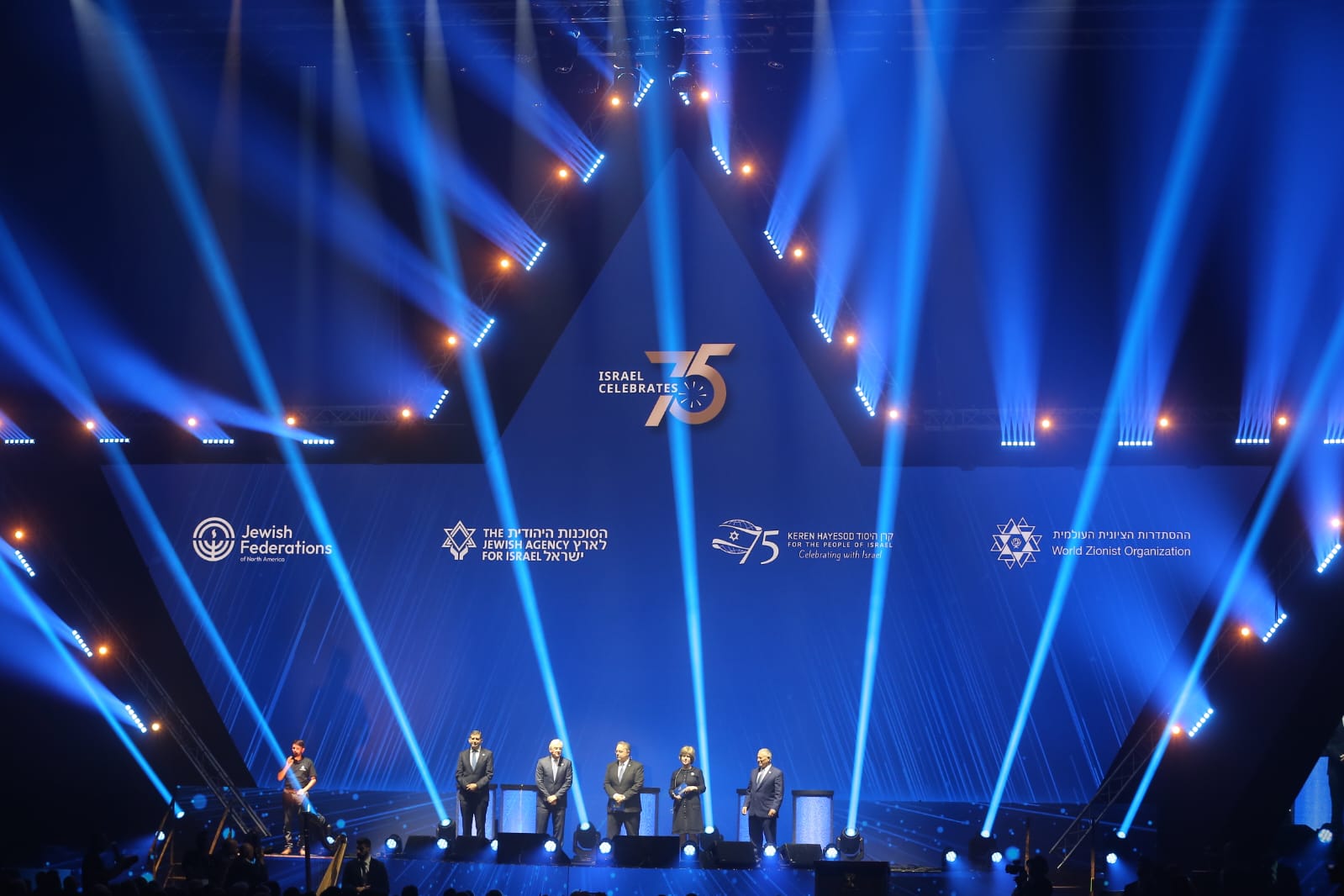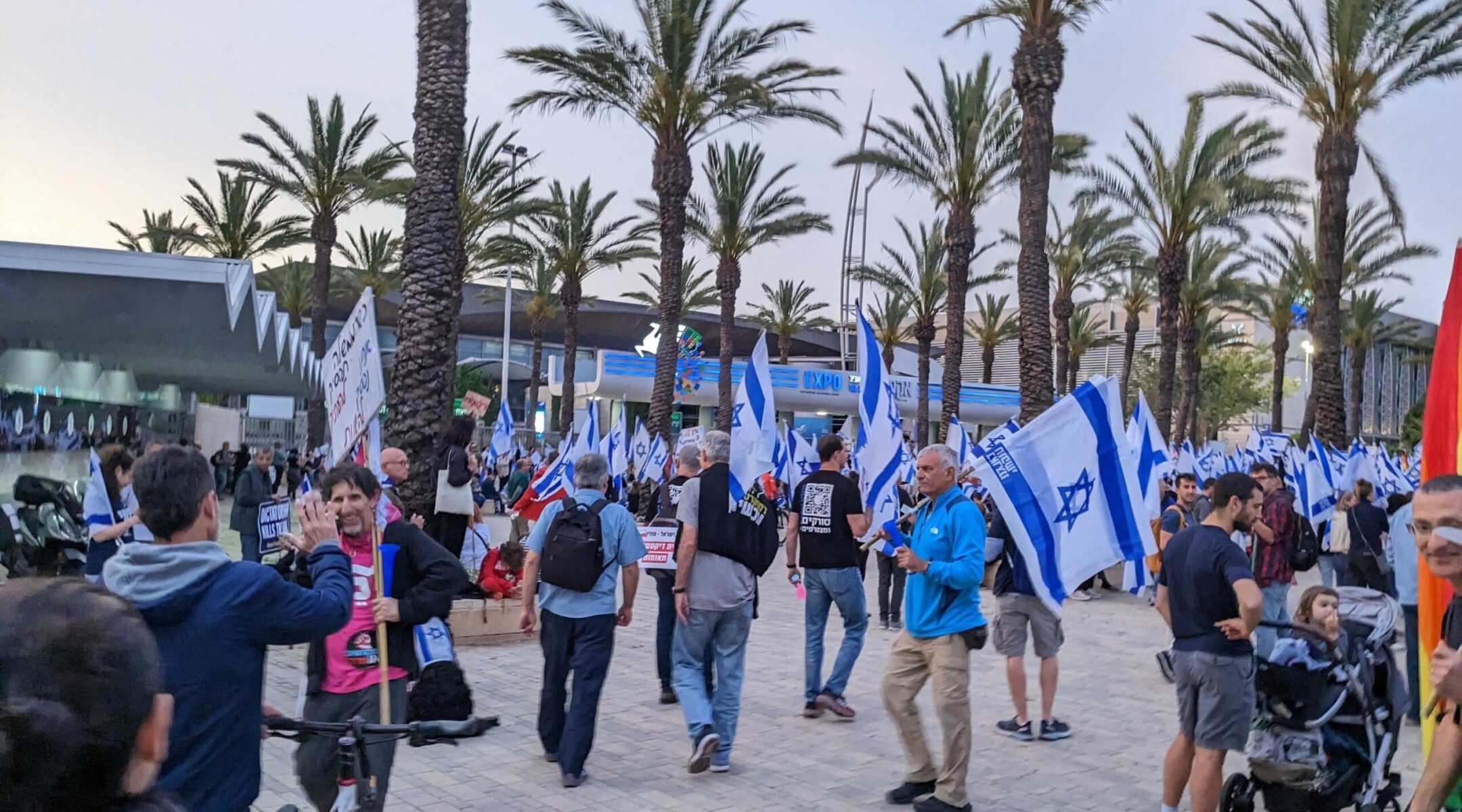TEL AVIV (JTA) — At a marquee conference of American Jewish leaders that kicked off tonight in Tel Aviv, the loudest cheers were for anti-government protesters, most of the energy could be found outside of the convention center’s gates, and the biggest news was who didn’t show up.
The General Assembly, the signature conference of the American Jewish organizational world, was meant to be a celebration of Israel’s 75th birthday and a testament to the enduring strength of ties between Israel and Diaspora Jewry. Sunday’s opening event, the Jewish Federations of North America said, was meant to pay tribute to that relationship — and feature speeches by Israeli President Isaac Herzog and Prime Minister Benjamin Netanyahu.
But in the face of loud protests outside the event, Netanyahu abruptly canceled his appearance on Sunday, citing a full schedule ahead of Israel’s Independence Day on Wednesday. Over the course of a series of speeches by international Jewish dignitaries, his name was not mentioned once.
Instead, both inside and outside the conference walls, the tone of the evening was set by the protesters. They gathered by the hundreds opposite one of the convention center’s entrances — and in smaller clusters around the building — giving the thousands American Jewish visitors a taste of the protest culture that has developed this year in Israel as huge numbers of Israelis have taken to the streets to oppose Netanyahu’s sweeping proposals to sap the power of the judiciary.

From the stage, the Jewish Federations of North America General Assembly in Tel Aviv was mostly business as usual — except that the prime minister backed out of attending. (Courtesy JFNA)
Protesters waved Israeli flags, chanted the word “democracy” syllable by syllable, and blew into small plastic horns whose blaring sound carried remarkably well — permeating the walls of the conference plenary session. An entrepreneur standing at a card table was selling packages each containing a horn and a small Israeli flag for, depending on who asked, either 20 or 30 shekels (roughly $5.50 or $8).
The most direct route from the train to the conference was blocked off, owing to Tel Aviv’s ongoing quest to build a citywide light rail system. So, with roads closed, the best way to get from the train station to the event was to follow the protesters — identifiable by the huge Israeli flags they carried or wore around their necks. Many were also pushing strollers or walking dogs.
“Israel must be a free democracy,” protesters chanted as attendees exited the event. “Please help us. Fascism shall not pass.”
Most of the protesters were gathered far from the gate where conference participants actually entered. But they got a shout out in the conference program as well. Julie Platt, the Jewish Federations’ board chair, drew a sustained round of applause and whooping from the 2,000 attendees when she spoke about how inspiring the protests were.
“What is clear is how passionate we all are about Israel and how central Israel is to our lives,” Platt said. “Its struggles our are struggles, its success is our success, and its debates are our debates. To the leaders of Israel, including those attending tonight, we stand united in our support of dialogue and broad consensus based on mutual respect.”
Then, she added, “To the protesters exercising their democratic rights, we see you, we hear you and we are inspired by your love of Israel.”
When the Jewish Federations last held the General Assembly in Israel, in 2018, Netanyahu sat onstage for a Q&A with the group’s chairman for more than half an hour. In Netanyahu’s absence this year, the night’s keynote speaker was Israeli President Isaac Herzog. His role is largely ceremonial, but he has been spearheading dialogue about the judicial overhaul — as well as issuing dire threats about what may happen if that dialogue fails.
Herzog repeated a version of those warnings Sunday night, portraying the debate over judicial reform as a cautionary tale about the dangers of polarization.
“The fierce debate over Israel’s direction in recent months is a striking example of the ways that alienation between different groups, and polarization that festers for years, becomes corrosive and weakens the pillars that hold our nation together,” he said. “I am convinced that there is no greater existential threat to our people than the one that comes from within.”
In his speech, Herzog announced an initiative called “Voice of the People” that will be aimed at fostering dialogue between Jews of differing opinions across Israel and the Diaspora. That initiative will be anchored by a conference he called the “Jewish Davos,” in a nod to the Switzerland-based annual economics conference that is seen as a global meeting of the minds.
“Nonpartisan, apolitical, Voice of the People will be a collaborative forum — one that can hold and reflect the full and diverse range of Jewish voices,” he said. “It will be a place where we can engage in serious, sensitive and strategic discussions on the most complex and pressing issues facing our people.”
If that conference happens, it would not be the first of its kind. Israeli President Shimon Peres, who served from 2007 to 2014, held an annual conference featuring famous names discussing hot-button issues. And historically, the federations’ General Assembly itself has been viewed as an ecumenical Jewish conference to discuss a wide range of issues.
Aside from that, the night’s program featured mainstays of traditional American Jewish gatherings celebrating Israel: a video with black-and-white stills from the country’s founding years, testimonials from Jewish immigrants to Israel from around the world, a performance by a musical group composed of Israeli soldiers. The conference will continue with a full day of sessions on Monday.
Near the end of the night, as the festivities were winding down, two people in the audience held up Israeli flags. The corner of one of them featured a quote from Israel’s national anthem that has become a protest slogan: “Free in our land.”
JTA has documented Jewish history in real-time for over a century. Keep our journalism strong by joining us in supporting independent, award-winning reporting.






